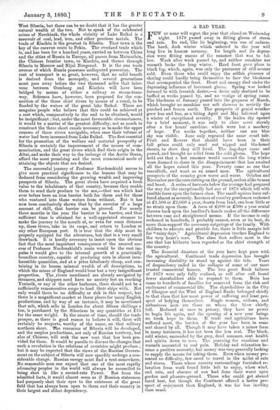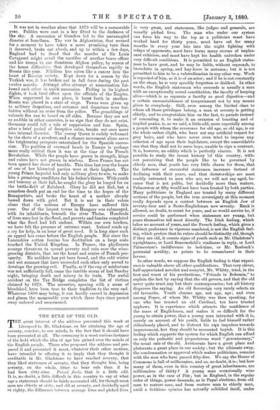A BAD YEAR. F EW or none will regret the year
that closed on Wednesday night. 1879 passed away in fitting gloom of storm and rain. Its end, like its beginning, was one of sadness. The hard, dark winter which ushered in the year will long live in human memory. Its length and its depres- sion were fitting omens of the summer that was to fol- low. Week after week passed by, and neither sunshine nor warmth broke the long winter. Hard frost gave place to black fog, which, again, was only the precursor of still severer cold. Even those who could enjoy the selfish pleasure of skating could hardly bring themselves to face the bleakness that accompanied the frost. Heart and energy died under the depressing influence of incessant gloom. Spring was looked forward to with feverish desire,—a desire only destined to be baffled as weeks passed by, and no vestige of spring came. The blackness of January passed into the greyness of March, which brought no sunshine nor soft showers to revivify the parched and frozen earth. The prospects of genial weather grew less and less, as a biting April and May followed upon a winter of exceptional severity. If the leaden sky opened for a brief moment, it was only to close more sternly after a few hours' sunshine, which were but a mockery of hope. For weeks together, neither sun nor blue sky was visible. June only repeated the same cruel tale. Fruit and flowers that should have been in their full prime could only send out nipped and blackened shoots, to show they still lived. The dog-days came and passed, and brought no relief from the cold gloom. The hope held out that a hot summer would succeed the long winter were doomed to share in the disappointment that has awaited all the hopes raised this year. Poverty came as one that travelleth, and want as an armed man. The agricultural prospects of the country grew worse and worse. October and November saw the corn rotting on the ground, useless alike to man and beast. A series of harvests below the average had prepared the way for the exceptionally bad one of 1879 which tell with terrible force upon the farmer class. The small squires have suf- fered almost as severely. Incomes of country gentlemen reckoned at £1,500 or £2,000 a year, drawn from land, can bear little or no strain upon them. A farm of £200 or £300 a year rental thrown back upon the landlord's hands makes all the difference between ease and straightened means. If the income is only reckoned in hundreds, it probably cannot, even at its best, do more than support the necessary outgoings of the family. With children to educate and provide for, there is little margin left for "rainy days." Agricultural depression touches England to the very heart's core. The class that suffers most is the one that has hitherto been regarded as the chief strength of the country.
The financial disasters of the year have kept pace with the agricultural. Continued trade depression has brought increasing disability to stand up against the tide. Years of despondency ended in the collapse of some of our most trusted commercial houses. The two great Bank failures of 1879 were only fully realised, as call after call found fewer shareholders able to respond to them. Ruin has come to hundreds of families far removed from the risk and excitement of commercial life. The shareholders in the City of Glasgow and the West of England Banks belonged chiefly to that class that has most power of suffering and least pro- spect of helping themselves. Single women, widows, and unbusiness men are those on whom the blow chiefly fell. Reduced at once to penury, they have no power to begin life again, and the opening of a new year brings no fresh hope to them. If trade and agriculture have suffered most, the burden of the year has been in some sort shared by all. Though it may have taken a minor form in many instances, it has not been the less real. The black, cold winter, succeeded by the grey, dead summer, sent health and spirits clown to zero. The yearning for sunshine and warmth amounted to real pain. Holiday and relaxation be- came a positive necessity, but money was very generally lacking to supply the means for taking them. Even when money pre- sented no difficulty, few cared to travel in the midst of rain and storm. Those whose country surroundings furnished re- laxation from work found little left to enjoy, when wind, and rain, and absence of sun had done their worst upon garden and pleasure-ground. Those who could get abroad fared best, but though the Continent offered a better pro- spect of enjoyment than England, it was far less inviting than usual. It was not in weather alone that 1879 will be a memorable Tear. Politics were cast in a key fitted to the darkness of the sky. A succession of blunders led to the unexampled disaster at Isandlana. The war in Afghanistan, that seemed for a moment to have taken a more promising turn than it deserved, broke out afresh, and up to within a few days, England had to dread that the murder of Sir Louis Cavagnari might entail the sacrifice of another brave officer and his troops to our disastrous Afghan policy, by reason of the home difficulties that developed themselves rapidly in Russia this year. Nihilism has eaten like a cancer into the heart of Russian society. Kept down for a season by the Turkish war, it has broken out in full force during the past twelve months. Attempt after attempt at assassination fol- lowed each other in quick succession. Failing in its highest flights, it took fatal effect upon the officials of the Empire. When suppressed in one place, it burst forth in another. Russia was placed in a state of siege. Towns were given up to military despotism, and entrance and departure were for- bidden without an order from the police. The grumblings of volcanic fire can be heard on all sides. Because they are not so audible in other countries, is no sign that they do not exist. 'Germany could tell a tale of suppression and fear. Spain, after a brief period of deceptive calm, breaks out once more into internal disorder. The young Queen is rudely welcomed by the shots of a revolver, and a chance movement alone saves the brightening prospects entertained for the Spanish succes- sion. The position of crowned heads in Europe is perhaps more really critical than it was at the time of the French Revolution. While the people have grown in strength, kings and rulers have not grown in wisdom. Even France has not been spared her share of trouble. This time last year the hopes of one of her historical parties were at their highest. The young Prince Imperial had only military glory to win, to make him a promising candidate for his father's throne. With youth and bravery at their full, he sought the glory he longed for on the battle-field of Zululand. Glory he did not find, but a nameless death put an end for the time to the hopes of the Bonapartists, and broke the heart of a mother already bowed down with grief. But it is not in their rulers -alone that the nations of Europe have suffered this year. One of the largest towns in Hungary was submerged, with its inhabitants, beneath the river Theis& Hundreds of lives were lost in the flood, and poverty and famine completed what the flood had left undone. Within our own borders, we have felt the pressure of extreme want. Ireland sends up a cry for help, in an hour of great need. It is long since such an appeal has come before the English people. Not since the Lancashire cotton famine has destitution on a large scale touched the United Kingdom. In France, the phylloxera scourge threatens to spread poverty and ruin over the wine- growing districts, that are the heart and centre of French pro- sperity. No antidote has yet been found, and the cold winter and wet summer that have succeeded each other only served to develope the growing evil. Finally, as if the cup of misfortune was not sufficiently full, came the terrible storm of last Sunday -night, bringing death and misery in its train. The awful accident on the Tay Bridge completes the list of victims claimed by 1879. The seventies, opening with a scene of bloodshed, have been true to their tradition to the very end. Whatever 1880 may bring, it can hardly exceed in depression and gloom the memorable year which three days since passed away unloved and unmourned.











































 Previous page
Previous page